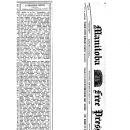Main menu
- ‘Abdu’l-Bahá’s Journey
- World Peace
- Stopping Racism in America
- Empowerment of Women
- More Principles...
- Prayer for America
A Reader’s Notes
“Books are finer world within the world.”
There is in the Fortnightly for April an article of striking interest by Miss Constance Maud on the Persian teacher, ‘Abdu’l-Bahá, who has been visiting in London, where Christians of every denomination sought him out for the sake of his resemblance to the Founder of Christianity. He has, we are told, some three million followers from among the great Oriental peoples. When asked by some if he were a re-incarnation of the Christ, he replied, “No, no, I am not the Christ, I am not even a prophet — Bahá’u’lláh was a prophet, but I am his son, and am just simply this — the servant of God. You also must be servants of God.” When asked about the various founders and teachers of the great world-religions and their status concerning God’s truth, he said (and he speaks through an interpreter) emphatically that all these had not an equal knowledge of truth. “No man can say that the branch of Mahomet can be compared to Jesus Christ, that most vital of the branches on the Tree of Life, when we clear away the dogma with which the churches have encrusted it, and go back to the Divine Teacher Himself.” Buddhism, he said, was once like a beautiful child fresh and fair from the hand of God, but is now like a decrepit old man.
No, no, I am not the Christ, I am not even a prophet — Bahá’u’lláh was a prophet, but I am his son, and am just simply this — the servant of God. You also must be servants of God.
‘Abdu’l-Bahá makes no high claims for himself beyond that of servant. But except for the vicarious sacrifice for sin, his teaching is the same as the teaching of Jesus: peace on earth, and the brotherhood of man, which he declares is far greater than mere patriotism. He denies that east is east and west is west in the spiritual kingdom. East and west, north and south, are predestined to one great brotherhood “uniting their voices in prayer to the Abha Father.” Miss Maud tells us that his humility and wisdom, his piercing insight into the very heart of the men and women who come before him, is that of a divine prophet. That ‘Abdu’l-Bahá is no charlatan we may believe when told that the Archdeacon of Westminster walked hand in hand with him up the nave of St. John’s church, and invited him to “address the congregation and offer for them his prayers and blessing.”
The beginning of the movement was about sixty years ago, when Bahá’u’lláh, the father of ‘Abdu’l-Bahá, began preaching the brotherhood of man. His forerunner, the “Báb,” like that other great herald of the Arabian wilderness, had proclaimed that such a master would follow him (“Báb”), and indicated the line of his teaching. I wonder if he called upon the people to repent. At any rate they assassinated him; and then Bahá’u’lláh, a follower, rose up and was received as the “long-waited One.” There were, as in the case of the early Christians, persecutions — wholesale massacres, that the new religion might be destroyed. It was the blood of the martyrs and the seed of the Church over again. In 1892, Bahá’u’lláh died in an exile’s prison, after appointing his son to succeed him. ‘Abdu’l-Bahá lived for many years in this prison at Akkah, his treatment varying according to the kind of Governor holding office. During the last years of the late Sultan of Turkey the Bahá’ís were fiercely persecuted, and when the Young Turks triumphed, their leader had been awaiting his death sentence. So that he has only been free for less than three years. I wish I had space to give his enlightened and advanced replies to questions on such subjects as re-incarnation, Christian Science, and so on.
There were, as in the case of the early Christians, persecutions — wholesale massacres, that the new religion might be destroyed. It was the blood of the martyrs and the seed of the Church over again.
‘Abdu’l-Bahá has very advanced views on the education of women and woman-suffrage. Intimately connected with Bahá’ísm is a great woman’s movement in Persia, whose leader, since assassinated, was the wife of a Mohammedan priest. Her name was Quarratu’l-Ayn, and she was converted to the new religion as suddenly as St. Paul himself, by hearing from behind her barred window the “Báb” preach. Our Foreign Mission workers will find this an interesting paper, and hopeful, too, for missions.
THE BOOKMAN.









